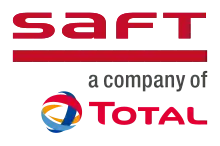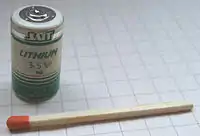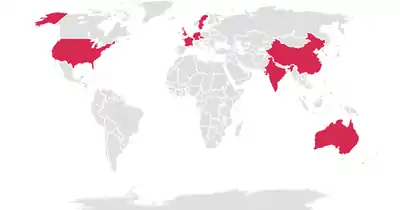Saft Groupe S.A.
Saft is a French company involved in the design, the development and the manufacturing of batteries used in transport, industry and defense. Headquartered in France, it has an international presence.[1][3]
 | |
| Type | Société anonyme |
|---|---|
| ISIN | FR0010208165 |
| Industry | Batteries |
| Founded | 1918 |
| Founder | Victor Hérold |
| Headquarters | , France[1] |
Area served | Worldwide |
Key people | Ghislain Lescuyer (Chairman and CEO) |
| Revenue | €628.7 million (2011)[2] |
| €79.9 million (2011)[2] | |
| €75 million (2011)[2] | |
| Total assets | €406.6 million (2011)[2] |
| Total equity | €1.01 billion (2011)[2] |
Number of employees | 4,100 |
| Parent | Total |
| Website | Saftbatteries.com |
The company was established in 1918 and was public from 1924 to 1995 and again from 2004 to 2016 when it became a subsidiary of oil company Total.
History

Beginnings
The Société des Accumulateurs Fixes et de Traction (SAFT) was founded in 1918, mainly by Victor Hérold, which since 1913 had been manufacturing batteries for the luggage carts that were used in railway stations and for the lighting of the locomotives from the Paris-Lyon-Marseille Company (PLM).[4] In 1924, the company was partially listed on the Paris Bourse.[5] In 1928, the Compagnie Générale Electrique (Alcatel) purchased it. In 1949, it introduced a new type of alkaline battery. The company widened its range of activities and markets, including power plants, telephone systems and industries in general. It introduced a revolutionary manufacturing system for sintered plates, which had a great impact in the aeronautic field. In 1953, the US Naval Air Command requested 2000 batteries of 24 V. The contract with the US military was of US$9,555,970 in 2019 dollars.[6][7] In 1980, together with PSA, Saft conducted a study to evaluate the potential of using batteries to power electric cars. During the next years, the investment was focused on built a sophisticated robotic assembly line.[8]
Global growth

In the 1940s, Saft opened a subsidiary in the United Kingdom and, in the 1970s, one in the United States. In the 1980s, the company settled in Singapore and continued its expansion.[5] It became the leading manufacturer of nickel-cadmium batteries[9] both in the aviation sector and in the railway sector.[8] In 1995, Alcatel delisted the company from the stock market and acquired a 100 percent of its shares. Later, Saft purchased Nife and Alcad, its main rivals, as well as the Czech company Ferak. In 2001 it suffered a setback and sold facilities in South Korea and Mexico.[5] The same year it acquired from Invensys plc the American company Hawker Eternacell, a leading provider of lithium batteries to the American and British armed forces.[10] It also took control of the American company ASB and Sonnenschein Lithium. In 2003, it purchased German company Friemann und Wolf Batterietechnik GmbH (Friwo), and the assets of Emisa and Centra, from Exide.[5]
Doughty Hanson Funds era
In 2004, the private equity firm Doughty Hanson Funds purchased from Alcatel, at a cost of 900 million euros, a 100 percent stake in Saft,[11] and listed it on the Euronext in June.[12] In July 2005, Saft agreed the purchase of a 51 percent stake in AMCO Power Systems Ltd with its owner, Amalgamations Private Ltd.[5] In January 2006 Saft and Johnson Controls Inc announced the launch of a joint venture named Johnson Controls-Saft Advanced Power Solutions LLC to develop, produce and sell advanced technology batteries for hybrid electric and electric vehicles.[13] In February of that year, Saft purchased from Amalgamations Private its remaining stake in AMCO Power Systems, which was renamed AMCO-Saft India Ltd.[14] In May 2006, EADS and Saft America, through ASB, formed the new subsidiary Advanced Thermal Batteries Inc located in Cockeysville, Maryland, with the purpose of supplying the military industry.[15] In April 2007, Doughty Hanson sold all its stake in Saft, after an accelerated bookbuilt offering of 6.8 million shares by Goldman Sachs International at a price of 23.75 euros per share.[12] Since then, the majority of the shares were kept on free float.[2]
Rise and fall of the partnership with Johnson Controls
In January 2008 Johnson Controls-Saft opened the first production facility for lithium-ion hybrid vehicle batteries in Nersac, France.[16] In 2009, Johnson Controls-Saft started the construction of a lithium-ion production plant in Michigan, while Saft built another for itself in Florida.[5] Despite some signs of promise, Johnson Controls was increasingly dissatisfied with the restrictions of the agreement and also sought a more important ally.[17][18] In May 2011, the American company request the dissolution of Johnson Controls-Saft Advanced Power Solutions LLC to the Delaware Court of Chancery.[13][17][18] The two companies agreed the separation and Johnson Controls paid Saft 145 million dollars for its shares in the joint venture as well as for the right to use certain technology developed by it. Johnson Controls retained the Michigan facility built by the partnership. The French joint facility was transferred to Saft.[19][20][21]
Projects and present
Saft wanted to accelerate its development through acquisitions in 2012 after cashing in on the end of its joint venture with Johnson Controls and refinancing debt.[22] In February 2013, the Boeing's difficulties with the 787 Dreamliner made Airbus drop the use of lithium-ion batteries for its A350,[23] which hit Saft because it had a supply contract with the aircraft manufacturer, though the company publicly denied a major impact.[24]
In July 2013, Saft was awarded a $6.5 million contract to supply high power lithium-ion batteries for the Lockheed Martin F-35 Lightning II[25] Saft also supplies the battery for the Exagon Furtive-eGT, a four-seat electric sports car produced by Exagon Motors. The battery is capable of withstanding 3,000 charge cycles while conserving 80% of its capacity.[26]
In 2016, the French oil company Total acquired all Saft shares and delisted it from the stock exchange in August of that year.[27]
Divisions
Industrial Battery Group (IBG)
The Industrial Battery Group division produces nickel rechargeable batteries for industry and transport. The use of its products include:
- Aircraft safety and starting systems.
- High-speed trains.
- Urban transport networks, including trams, metros, and signalling systems.
- Back-up power systems.
- Oil and gas plants.
- Industrial facilities
- Power generation and distribution systems.
- Telecommunications networks.
- Emergency lighting.
- Professional electronics.
- Storage for renewable energy systems.[1][3]
Specialty Battery Group (SBG)
It produces lithium and rechargeable lithium-ion energy storage systems for the electronic, defence, and space industries. They are used in:
- Utility meters.
- Electronic toll collection.
- Automated meter readers and road tolling systems.
- Military communication systems.
- Satellites.
- Torpedoes.
- Space launchers.
- Military hybrid vehicles.
- Small submarines.
- Missiles
- Night-vision goggles.
- GPS systems.
- Medical equipment.
- Asset tracking.
- Sonobuoys.
- Computer memory back-up systems.
- Radios and other portable systems for military use.[1][3]
References
- "Company Description: Saft Groupe". businessweek.com. BusinessWeek. Archived from the original on 2011-09-18. Retrieved 14 August 2012.
- "2011 Annual Report" (PDF). Saft. Retrieved 14 August 2012.
- "Company Profile: Saft Groupe". reuters.com. Reuters. Retrieved 14 August 2012.
- "Usine Saft Romainville" [Romainville's Saft factory] (in French). Fr.topic-topos. Archived from the original on 2010-04-13. Retrieved 14 August 2012.
- "History". Saft. Archived from the original on 2009-08-26. Retrieved 14 August 2012.
- Federal Reserve Bank of Minneapolis. "Consumer Price Index (estimate) 1800–". Retrieved January 1, 2020.
- "Here's the Long-Life Battery", Popular Mechanics, vol. 101 no. 3, p. 252, March 1954, ISSN 0032-4558
- Base Mérimée: Usine de matériel électrique industriel dite S.A.F.T. (Société des Accumulateurs Fixes et de Traction), Ministère français de la Culture. (in French)
- "III". National Critical Technologies Report (1995). DIANE Publishing. 2004. p. 12. ISBN 0-7881-1978-8.
- "Saft Acquires Hawker Eternacell From Invensys PLC". PRNnews.com. Retrieved 14 August 2012.
- Clark, Nick (16 May 2005). "Doughty Hanson plans Saft float with Goldman". Financialnews.com. Retrieved 14 August 2012.
- "Doughty Hanson Sells Remaining Stake in Saft". Doughtyhanson.com. Retrieved 14 August 2012.
- "Johnson Controls files petition to dissolve Li-ion battery JV with Saft". Greencarcongress.com. 18 May 2011. Retrieved 14 August 2012.
- "New investments". PRNnewswire.com. 7 July 2008. Archived from the original on 11 December 2012. Retrieved 14 August 2012.
- "EADS and Saft America launch thermal battery company devoted to military market". Militaryaerospace.com. 16 May 2006. Retrieved 14 August 2012.
- Kenney, Brad (31 January 2008). "Johnson Controls-Saft Opens Production Facility for Lithium-Ion Hybrid Vehicle Batteries". Industryweek.com. Retrieved 14 August 2012.
- Pentland, William (19 May 2011). "Battery Battle Brews for Johnson Controls, Saft". forbes.com. Forbes. Retrieved 15 August 2012.
- Fehrenbacher, Katie (19 May 2011). "Report: Johnson Controls Divorcing Saft Over Grid Battery Market". Gigaom.com. Retrieved 15 August 2012.
- King, Danny (7 September 2011). "Johnson Controls Buys Out Saft Joint Venture". Autoobserver.com. Archived from the original on 17 January 2013. Retrieved 15 August 2012.
- Warburton, Simon (5 September 2011). "US: Johnson Controls and Saft finish battery joint venture". Just-auto.com. Retrieved 15 August 2012.
- Barrett, Rick (2 September 2011). "Johnson Controls, Saft agree to end joint venture". JSonline.com. Retrieved 15 August 2012.
- "Saft eyes acquisitions after refinancing debt". reuters.com. Reuters. 1 March 2012. Retrieved 15 August 2012.
- Hepher,Tim (15 February 2013). "Airbus drops lithium-ion batteries for A350". reuters.com. Reuters. Retrieved 17 April 2013.
- "Saft sees little impact from Airbus dropping lithium-ion battery". reuters.com. Reuters. 18 February 2013. Retrieved 17 April 2013.
- "Saft Awarded $6.5 Million Contract to Pioneer High Power Li-ion Aviation Battery Capabilities for F-35". Fort mill times. 22 July 2013. Archived from the original on 23 July 2013. Retrieved 22 July 2013.
- "Essai EXAGON Furtive eGT". Motor Legend. 9 September 2013. Retrieved 9 September 2013.
- "Total delists Saft from stock exchange". Renewablesnow.com. 15 August 2015. Retrieved 3 June 2017.
